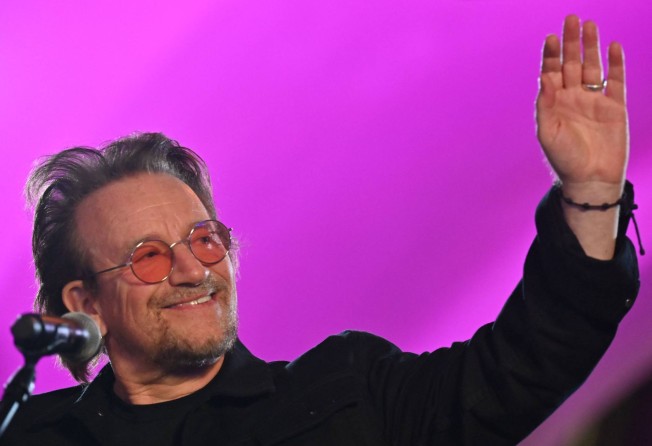
Bono on mortality, drinking with Sinatra, and U2’s ‘ugly pop song’ that became US No 1 hit – reflections on ‘a life playing stadiums for 35 years’
- The rock legend was tight-lipped about his 2016 heart surgery, but now addresses this and other aspects of his life, from U2’s huge success, to losing close ones
- In Surrender: 40 Songs, One Story, the singer recalls triumphs and regrets, such as when U2 dropped their 2014 album onto every personal Apple device
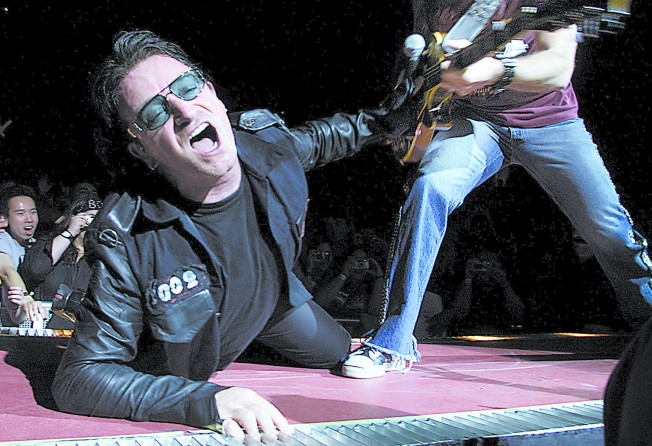
Several years ago, U2 fans wondered about the brush with death experienced by the band’s captivating frontman, Bono.
Usually talkative, Bono refused to elaborate on this intense health scare, saying he would discuss it in due time.
That time arrives in the opening pages of Surrender: 40 Songs, One Story, the singer’s rhythmical, time-shifting memoir written with the refinement and astuteness that we’ve come to expect from one of rock’s most profound lyricists.
He was born, he says, with “an eccentric heart” – a heart that years later would require eight hours of surgery, to repair a “blister” on his aorta.

Bono turns his recollections of the 2016 operation – the doctor “wielding his blade with the combined forces of science and butchery”; his desire to have the warmth of his wife, Ali, beside him – into a metaphor for success.
The triumphs U2 have achieved throughout their nearly five-decade history are recounted with a combination of awe and disbelief. But so are the blunders (that unannounced drop of 2014’s Songs of Innocence album onto every personal Apple device? Not the best idea, it turned out), which Bono, 62, owns with self-effacing humour.
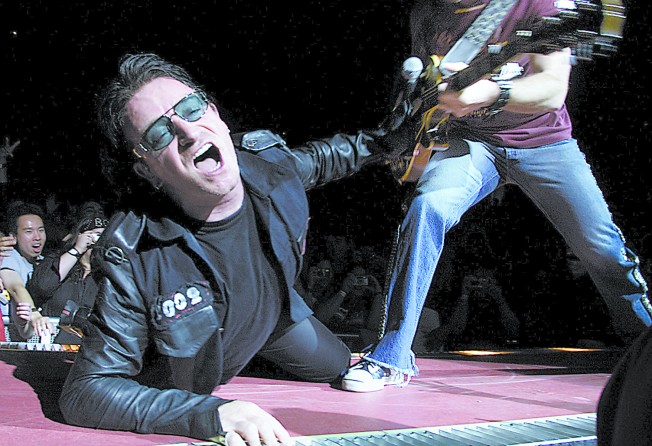
As he describes the band: “We are men who bear some scar tissue from our various struggles with the world, but whose eyes are remarkably clear considering the vicissitudes and surreality of a life playing stadiums for 35 years.”
Throughout the 40 chapters of Surrender – each named after a U2 song with accompanying sketches by Bono – the man born Paul Hewson tunnels his way through personal heartache (the death of his beloved mother as a teen, his knotty relationship with his “da”); his unwavering bond with Ali; the challenges of existing as a rock-star-activist; and the fissures and feats experienced by his enduring band.
But first, U2’s landing in America. In their blue coach bus with “eight coffin-like rectangular pods”, the quartet of Bono, drummer Larry Mullen Jr., guitarist the Edge and bassist Adam Clayton hit the US in 1981 for their first tour, a year after their debut album, Boy.
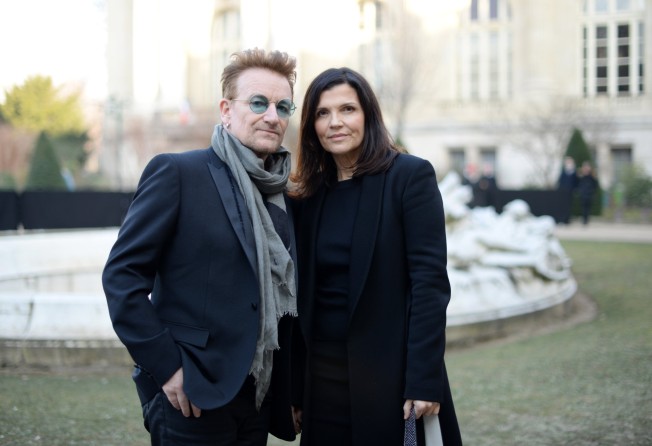
Bono’s memories of that outing are rich: New Orleans was “overripe fruit just turning”; Texas a “flat continent of freeways and fields”; Arizona, with “parched land to build on” and an “unreasonable sun to build under”.
But his fondest memory is sitting at a traffic light in Los Angeles with the Edge and hearing their breakthrough single, I Will Follow, coming out of two cars on either side, “beautifully out of sync”.
In the memoir, Bono also explains why he thought With or Without You was an “ugly pop song”.
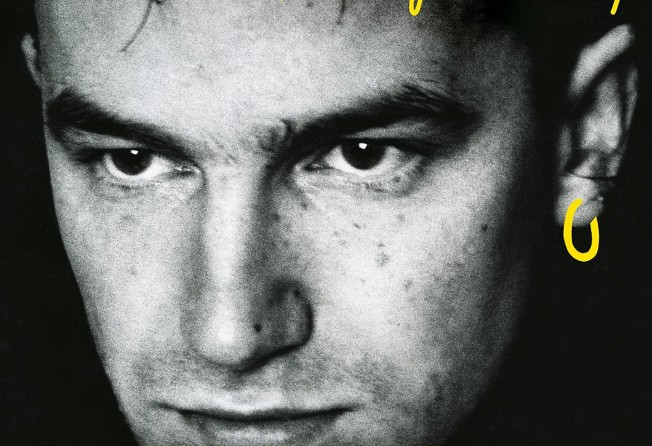
The band’s thumping 1987 hit – U2’s first No 1 song in the US, written to express the “duality” between Bono and Ali – was influenced by the music of rock ’n’ roll singer-songwriter Roy Orbison and a bit of Harry Nilsson’s Without You.
But while seeking a new sound, Bono felt the band “landed in a place called saccharine”, with the song becoming “that dreadful thing that a real group of artists could never own up to: an ugly pop song”.
U2 abandoned With Or Without You during the recording sessions for their album The Joshua Tree, but it was rescued by Irish singer friend Gavin Friday, who bellowed to the band, “What’s wrong with pop music?”
Bono’s love for his bandmates is sprinkled among remembrances in numerous chapters, but his recounting of a 1993 incident during the band’s Zoo TV tour in Sydney is as heart-wrenching as it is detailed.
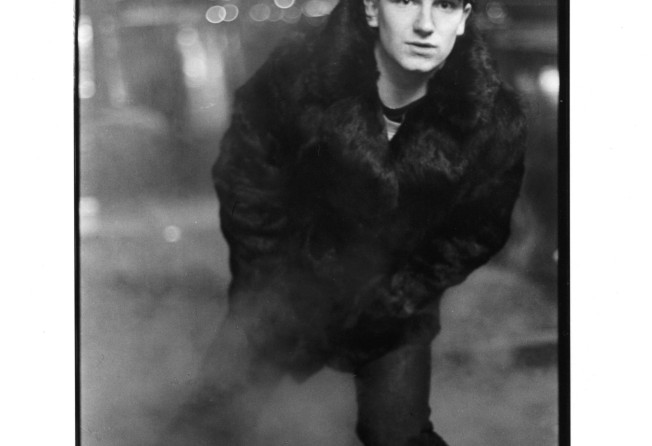
Having “overshot the runway with drink and drugs”, Clayton missed the taping of a TV performance with U2. Band manager Paul McGuinness informed the group that Clayton would survive, but was “not OK” after the bassist was found unconscious in his hotel room.
The band performed for the first time without a founding member, but, Bono says, “We got through. We recovered. Adam has been in recovery ever since.”
Still on the subject of mortality, with vivid recall of a night on a beach with Michael Hutchence – then the frontman of Australian rock band INXS – Bono shares their conversation about Kurt Cobain, who had just died by suicide.
“If he’d just waited, mate, he’d have found a way out of whatever hole he was in. Didn’t need to be a grave,” Hutchence said.
These words are particularly eerie, as Hutchence would also die by suicide three years later, in 1997.
Bono writes that after Hutchence split from Danish model Helena Christensen and fell for British TV personality Paula Yates, the new couple’s intensity and recreational drug use became worrisome to the point that Bono and Ali refused to become godparents to Hutchence and Yates’ child, Tiger Lily.
Still, “neither of us dreamed they’d both end up dead so soon. Even now, I can’t believe I’ve just written that,” Bono says.
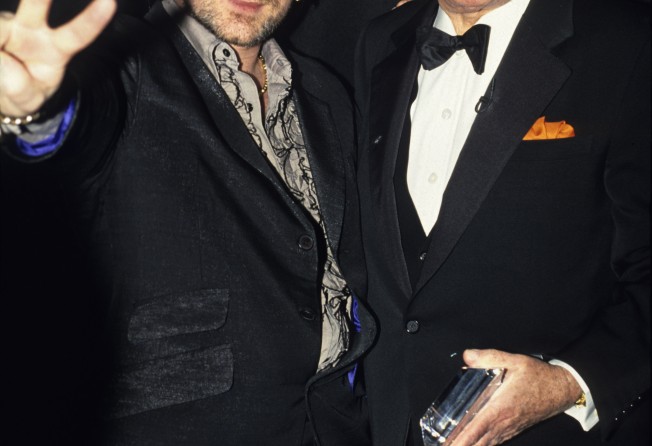
Yates died of a drug overdose in 2000.
On a less sombre note, after Bono filmed a video for I’ve Got You Under My Skin in the California desert with Frank Sinatra – the song was recorded for Sinatra’s 1993 Duets album – the legend’s wife, Barbara, called Bono to invite him and the Edge over to their house for drinks.
Feeling self-conscious about his appearance, particularly his two earrings, Bono “drank quickly to compensate – and worse, I mixed my drinks”.
Tequila in “huge fishbowl glasses” was the culprit that caused Bono to fall asleep on the white couches in the Sinatras’ screening room, waking up to damp pants and the shameful possibility of having wet himself. Instead, he had merely spilled his drink.